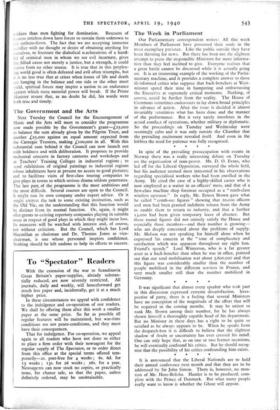In spite of the prevailing preoccupation with events in Norway
there was a really interesting debate on Tuesday on the organisation of man-power. Mr. D. 0. Evans, who led off for the Liberal Opposition, surveyed the whole field, but his audience seemed most interested in his observations regarding specialised workers who had been enrolled in the Army. He cited the case of a highly-skilled caster who is now employed as a waiter in an officers' mess, and that of a first-class machine shop foreman occupied as a " tenth-class wireless operator." In reply, Mr. Ernest Brown gave what he called " comb-out figures " showing that 20,000 officers and men had been granted indefinite release from the Army to enable them to return to industry, and that a further 13,000 had been given temporary leave of absence. But these round figures did not entirely satisfy the House and especially those members—and their number is growing— who are deeply concerned about the problems of supply. Mr. Molson was not speaking for himself alone when he expressed his concern at the " tone of complacency and satisfaction which was apparent throughout my right hon. Friend's speech." Lord Winterton, who is a far greater asset as a back-bencher than when he was in office, pointed out that our total mobilisation vvaS about 3,600,000 and that this figure was considerably smaller than the number of people mobilised in the different services in France, and very much smaller still than the number mobilised in Germany. * * * *










































 Previous page
Previous page